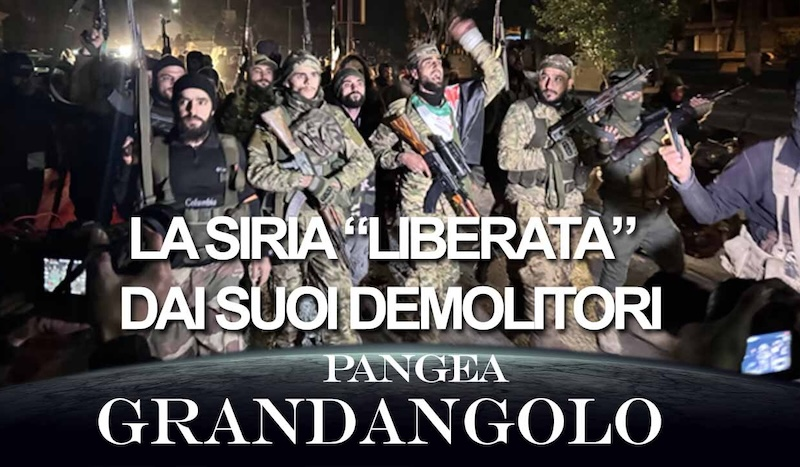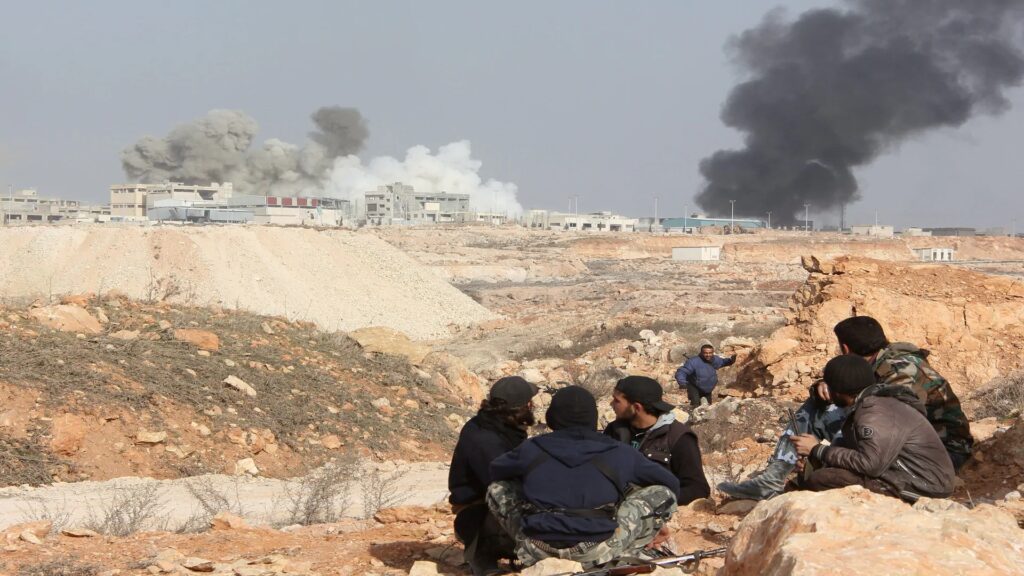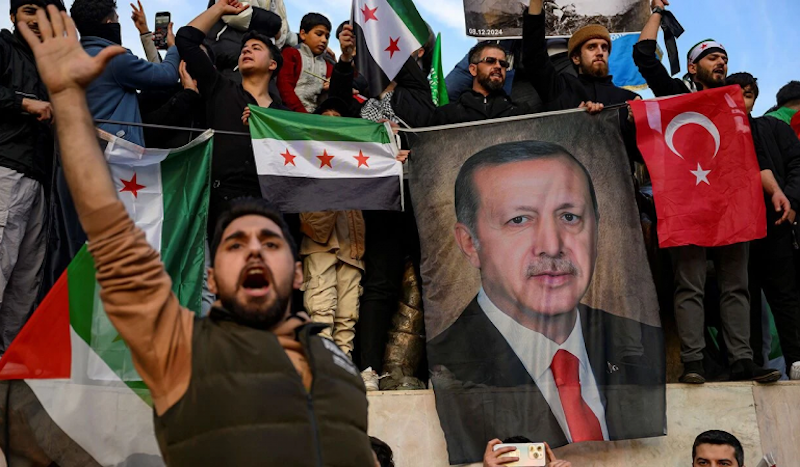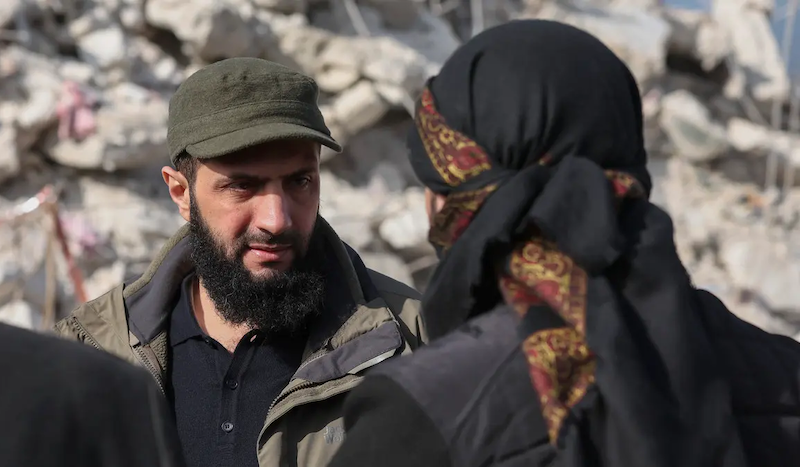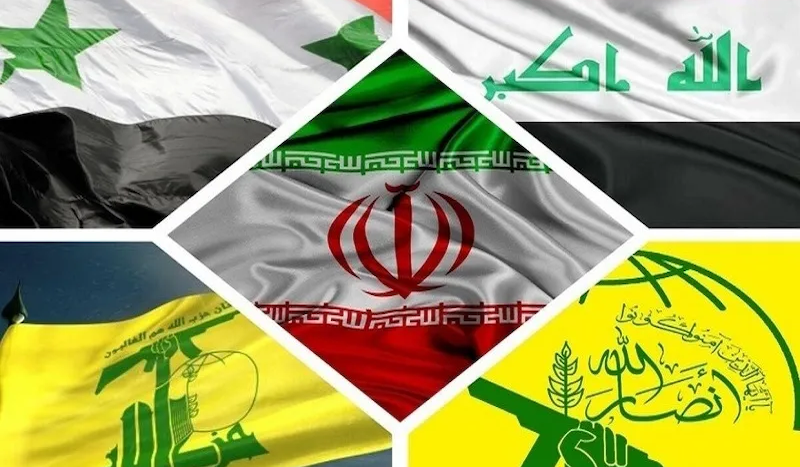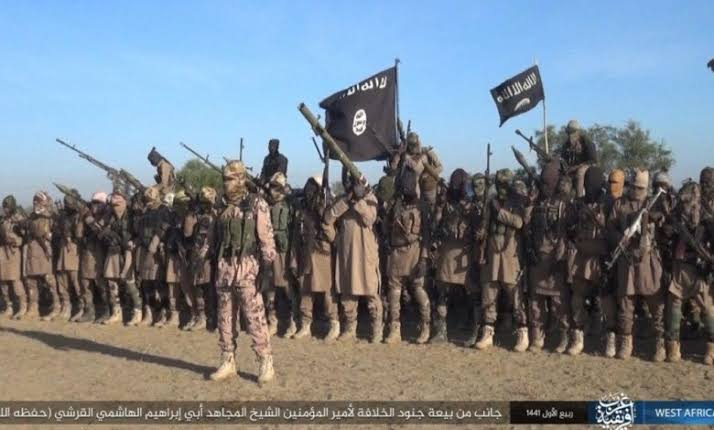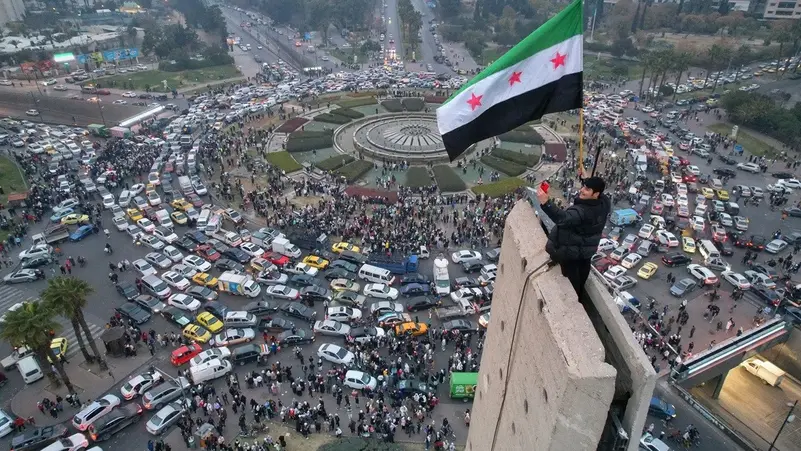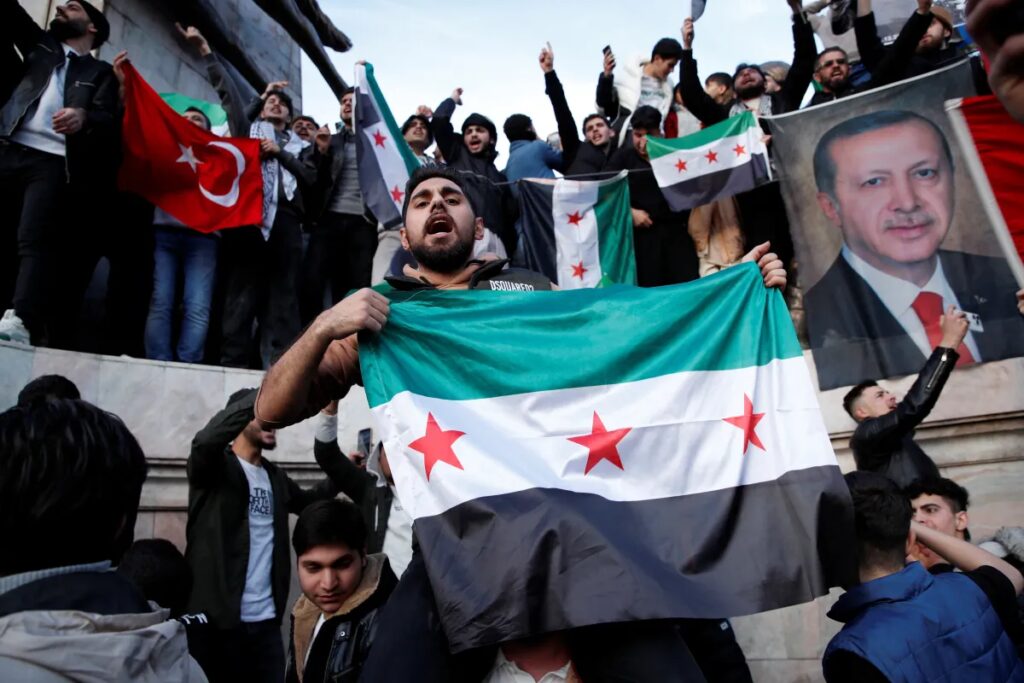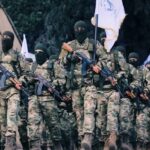
L’Occident collectif se lèvera-t-il pour défendre les derniers chrétiens syriens lorsque les Drapeaux noirs viendront les purger ?
Le modus operandi standard de l’Hégémon est toujours de Diviser pour Régner. Acculés par la montée inexorable de la réalité multinœudale, ils ont vu une ouverture pour un redémarrage impérial, misant tout sur l’établissement du «Grand Moyen-Orient» esquissé encore à l’époque de Cheney.
L’axe de fer des néocons straussiens, des Zio-cons et des psychopathes de l’Ancien Testament à Tel-Aviv est obsédé par la destruction de l’Axe de la Résistance, en utilisant leur réseau transnational de tueurs sanguinaires pour étendre le chaos et la guerre civile sectaire à toute l’Asie de l’Ouest. Dans ce scénario idéal, ils rêvent de frapper mortellement la tête du serpent : l’Iran.
Le sultan Erdogan, jouant le rôle de pigeon utile, a proclamé :
Une «période brillante» pour la Syrie a commencé.
En effet. Une période faste pour les coupeurs de têtes du Drapeau noir, les bombardiers de Tel-Aviv et les accapareurs de terres, qui se nourrissent de la carcasse de la Syrie.
Les tueurs psychopathologiques de l’Ancien Testament, via plus de 350 frappes, ont totalement détruit toute l’infrastructure militaire de l’ancienne Armée arabe syrienne (AAS) ; les usines d’armement, les munitions, les bases, les avions de chasse, notamment la base aérienne de Mezze à Damas, les systèmes antinavires russes, les navires eux-mêmes (à Lattaquié, à proximité de la base navale russe) et les positions de défense aérienne.
En résumé, il s’agit de la démilitarisation de l’ancienne Syrie par le duo OTAN/Israël, sans que personne dans le monde arabe et en terre d’islam ne bronche, à commencer par les tueurs du Drapeau noir qui se sont emparés de Damas.
Ajoutez à cela l’invasion et l’accaparement des terres, et Tel-Aviv déclare officiellement l’annexion définitive du Golan, qui appartient légalement à la Syrie et dont la restitution a été exigée par l’ONU après la guerre de 1967.
La guerre éclair psycho de l’Ancien Testament
Parallèlement, l’aviation turque a bombardé l’ancienne base russo-syrienne de Qamishli, à l’extrême nord-est. Le prétexte : éviter que les Kurdes et les tribus arabes soutenus par les États-Unis ne s’emparent des armes. Pour les Russes, ce n’était peut-être pas très grave, car ils avaient suffisamment de temps pour évacuer leurs précieuses ressources de l’est de l’Euphrate.
La Russie a donné asile à Suheil al-Hassan, un homme redoutable et absolument irréprochable, candidat sérieux au titre de tacticien et de stratège militaire de premier plan dans le monde d’aujourd’hui. Les Russes ont misé sur lui dès 2015 et ont assuré sa sécurité personnelle. Personne en Syrie n’apprécie les gardes du corps russes, pas même Assad. Il a été le seul commandant à remporter des batailles de facto pendant les dix jours de la chute de la Syrie.
Au milieu d’un torrent de pessimisme, ce qui se passe, rapide comme l’éclair, c’est que l’OTAN/Israël se nourrit de la carcasse et divise un pays mort avec un ramassis d’idiots utiles et de marionnettes – des faux djihado-salafistes woke aux Kurdes américanisés. Manifestement, un QI collectif inférieur à la température ambiante empêche cette foule de se rendre compte qu’elle se bat pour le même Suzerain.
Les hommes de Tel-Aviv ont avancé leur guerre éclair dans la campagne de Damas et pourraient se trouver à 15 km au sud de la capitale ; une manœuvre classique de lebensraum, qui fait partie de leur projet colonial, et qui permet d’obtenir un effet de levier maximal sur le flanc libanais.
Ce point est absolument crucial et extrêmement inquiétant pour l’Axe de la Résistance : tout le Sud-Liban est désormais exposé à une attaque massive de l’occupation israélienne, car les plaines fertiles entre Chtoura, dans la vallée de la Beqaa, et Aanjar recèlent non seulement de précieuses ressources naturelles, mais constituent également une voie d’accès directe à Beyrouth.
Les scorpions se retournent les uns contre les autres
Parallèlement, les Drapeaux noirs se sont emparés de Damas. Des massacres sont perpétrés sur tout le spectre – notamment des chefs religieux et des scientifiques, mais surtout d’anciens responsables de l’armée, d’anciens membres du contre-espionnage syrien, voire des civils accusés d’être d’anciens militaires.
Son éminence, le cheikh Tawfiq al-Bouti, fils du célèbre cheikh Muhammad Said Ramadan al-Bouti, ancien imam de la vénérable mosquée des Omeyyades, a été assassiné dans sa madrassa de Damas.
Comme on pouvait s’y attendre, les scorpions se retournent les uns contre les autres ; les bandes terroristes rivales de Hayat Tahrir al-Cham (HTS) exigent que les hommes de main de Joulani libèrent leurs membres emprisonnés dans le Grand Idlibistan, et menacent à présent d’attaquer HTS.
À Manbij, les terroristes soutenus par les Turcs tuent ouvertement les Américano-Kurdes dans les hôpitaux. Le nord et le nord-est de la Syrie sont plongés dans une anarchie totale.
Les tribus qui refusent d’accepter les Américano-Kurdes et leur projet d’État communiste-laïque, et qui refusent également de rejoindre le réseau terroriste djihado-salifiste soutenu par la Turquie, sont maintenant qualifiées d’«ISIS», et sont dûment bombardées par les avions de combat américains. Certains peuvent en effet être encore des membres d’ISIS : ils l’étaient avant l’automne 2017, et il y a encore des vestiges crypto-ISIS qui errent dans le désert.
L’armée russe a positionné ses navires jusqu’à 8 km de la base navale de Tartous. Cela n’assure pas une sécurité totale – car ils peuvent toujours être atteints par des drones et de l’artillerie, ainsi que par de petites embarcations.
Pour l’aviation à Hmeimim, c’est encore plus compliqué. Moscou a déjà envoyé un message clair : si la base est touchée, les répercussions seront dévastatrices. Les HTS, pour leur part, se sont surtout concentrés sur l’occupation de Lattaquié.
L’avenir des bases russes reste un mystère : il dépendra d’une épineuse négociation directe entre Poutine et Erdogan.
Joulani, le nouveau calife de facto d’al-Cham, ne deviendra pas chef à ce stade initial, car il effraie la plupart des Syriens à mort, indépendamment de sa méga-conversion woke sur le «chemin de Damas».
Il sera autoproclamé «chef militaire». Une marionnette désignée – Mohammed al-Bachir – conduira la «transition» jusqu’en mars 2025. Il est pratiquement certain qu’Al-Bachir sera détesté par toutes les factions. Cela ouvrira la voie à un coup d’État de Joulani, coupeur de têtes repenti, qui s’emparera d’un pouvoir illimité.
C’est en Syrie, à Antioche, l’une des villes les plus redoutables de l’Empire romain, que les disciples de Jésus ont été appelés «chrétiens», du grec christianos. Antioche a été réduite à la petite ville d’Antakya, qui fait partie de la Turquie. Le sultan Erdogan rêve qu’Alep fasse également partie de la Turquie.
Le grec était la langue de ce coin de l’Empire romain : Le latin n’était utilisé que par les occupants – militaires et dirigeants.
L’église dirigée par le patriarche d’Antioche s’est développée dans toute la Syrie jusqu’à l’Euphrate.
L’Occident collectif se lèvera-t-il pour défendre les derniers chrétiens syriens lorsque les Drapeaux noirs viendront les purger – ainsi qu’ils le feront ? Bien sûr que non. L’Occident collectif continue de jubiler sur la fin du «dictateur» alors que les Drapeaux noirs et les vautours de l’Ancien Testament organisent leur bal des vampires sur le cadavre d’un pays.

